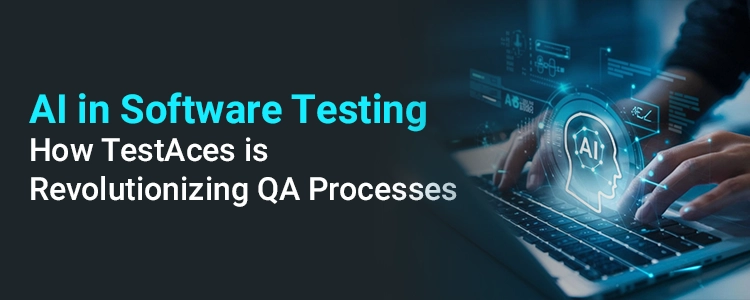
AI in Software Testing: How TestAces is Revolutionizing QA Processes
Speed and quality in software development are no longer opposing forces—they can now complement each other seamlessly. As digital products grow more complex, so does the need for robust, intelligent testing processes. Traditional manual testing and even rule-based automation often fall short in detecting subtle bugs or adapting to agile workflows. That's where AI in software testing emerges as a game-changer—reshaping how teams approach Quality Assurance (QA) and streamlining the road from development to deployment.
From test case generation to predictive analysis, artificial intelligence brings a level of insight, accuracy, and efficiency that human testers and basic automation tools struggle to achieve on their own. But what does this really look like in practice? And how is the integration of AI transforming quality assurance into a proactive, scalable, and smart function?
Let's unpack the real-world impact of AI-powered QA and why it's becoming indispensable for modern tech teams.
Why Traditional QA Methods Fall Short
Manual testing has long been the cornerstone of QA. While human intuition and expertise are valuable, this method is time-consuming, error-prone, and lacks scalability. Even traditional automated testing tools, which rely heavily on predefined rules, can struggle with dynamic user interfaces or rapidly changing requirements.
For fast-moving development teams, these limitations lead to bottlenecks, delayed releases, and rising QA costs. With customers demanding bug-free, seamless experiences across devices and platforms, traditional QA just isn't enough anymore.
The Rise of AI-Powered QA
The shift toward AI-powered QA addresses these very challenges by introducing self-learning algorithms that evolve with the product. Rather than following static test scripts, AI can analyze patterns in code, predict failure points, prioritize critical test paths, and even auto-generate test cases based on past performance.
Machine learning, natural language processing, and computer vision are being used to test applications the way real users would—clicking through interfaces, interpreting responses, and identifying issues that may not have been anticipated by developers or testers.
This leap in intelligence means QA is no longer a reactive phase at the end of the development cycle—it becomes an integrated, proactive component of the software lifecycle.
Key Benefits of AI in QA
The benefits of AI in QA are both immediate and long-term, especially for organizations aiming to scale without compromising quality.
-
1. Accelerated Testing Cycles
AI significantly reduces the time required for regression, performance, and UI testing by automating test execution and result analysis. This leads to faster feedback loops and quicker releases.
-
2. Smarter Test Coverage
AI identifies gaps in coverage by analyzing historical defect data and usage patterns. This ensures that critical paths are tested thoroughly while avoiding redundancy.
-
3. Reduced Human Error
Automated systems, especially those driven by AI, are less likely to overlook edge cases or inconsistencies, leading to more reliable testing outcomes.
-
4. Predictive Analytics
AI tools can forecast potential failure points by recognizing trends in application behavior or past bugs. This insight allows teams to proactively fix issues before they escalate.
-
5. Efficient Resource Allocation
By automating repetitive tasks and optimizing test prioritization, human testers can focus on exploratory and usability testing—areas where human insight adds the most value.
Real-World Use Cases of Automated Testing with AI
Imagine a mobile banking app that undergoes weekly updates. Traditionally, the QA team would spend hours manually testing core transactions after each release. With automated testing with AI, the platform learns which areas of the app are most critical based on user interactions and historical bug data, then runs targeted regression tests automatically after each deployment.
Or consider an e-commerce website during a seasonal sale. Instead of manually scripting every scenario for desktop, tablet, and mobile devices, AI-powered tools dynamically adapt to interface changes, ensuring that cart functions, payment gateways, and checkout processes perform seamlessly across environments.
These are no longer hypothetical scenarios—many teams are already leveraging AI to test smarter, not harder.
The Future of Software Testing is Intelligent
As software continues to permeate every aspect of our lives—from smart homes and healthcare to fintech and education—the margin for error shrinks. AI not only enhances the accuracy and efficiency of QA processes but also future-proofs them against rapidly changing technology trends.
In the near future, we can expect AI to not just support QA but fully orchestrate it. Test environments will self-heal, test data will be auto-generated based on privacy compliance rules, and quality gates will be enforced autonomously. Teams will shift their focus from fixing bugs to preventing them altogether.
The integration of AI in software testing isn’t just an upgrade—it’s a transformation.
Final Thoughts
While AI won't replace human testers, it certainly enhances their capabilities. It acts as a powerful assistant—handling the tedious, repetitive parts of testing and surfacing insights that would take days to uncover manually. Embracing AI in QA is no longer optional for high-performing software teams; it’s essential for staying competitive in today’s digital ecosystem.
The synergy between human expertise and machine intelligence ensures that software isn’t just tested—it’s continuously improved, at scale.
About TestAces
At the forefront of this intelligent QA revolution is TestAces, a company leveraging cutting-edge AI technologies to redefine software testing. With its focus on delivering faster, smarter, and more reliable QA solutions, TestAces empowers organizations to release high-quality software with confidence. From test automation to predictive analytics, the platform is built to optimize every stage of the QA lifecycle.
FAQs
AI enhances QA security testing by identifying vulnerabilities faster, predicting potential attack patterns, and continuously monitoring risks. This proactive approach helps protect applications from security breaches before they occur.